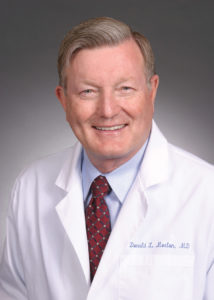
“Don Morton was one of the most famous cancer surgeons in the world and was been instrumental in changing the face of cancer and cancer research,” says Anton J. Bilchik, MD, PhD, chief of medicine and chief of gastrointestinal research.
During his remarkable career, Dr. Morton, who died Jan. 10, 2014, of heart failure at age 79, made significant contributions in two distinct fields: surgical oncology research and surgical fellowship training. On the research side, he devised a procedure that has become the standard of care for melanoma and breast cancer. He also was a pioneer in the development of cancer vaccines. As an educator, he worked hard to mentor the next generation of surgical oncologists, training more than 135 fellows.
“I’m very proud 80 percent of them are university professors,” Dr. Morton said. “Ten percent of them are deans or department chairs, and 45 percent are chiefs of their respective divisions of surgical oncology. They are widely distributed throughout the country and will continue to make contributions to cancer research long after I’m gone.”
It was a remarkable journey for the world-renowned surgeon, who was chief of the division of surgical oncology at UCLA Medical Center before he established the John Wayne Cancer Institute in 1991 Santa Monica. Dr. Morton grew up in poverty, a rural West Virginia coal-mining town. He attended Berea College, a small college in Kentucky geared toward disadvantaged youth in Appalachia. His mother stressed the importance of education.
“For me, I think the greatest accomplishment was making it from rural West Virginia to the Westside of Los Angeles,” he said. “I grew up during the Depression in a house that my dad built. We had no running water, no indoor plumbing and no electricity.” As a youngster, Dr. Morton tended pigs, cows and chickens in the morning before school and again in the evening. “Only then could I do my homework, by the light of a kerosene lamp.”
After graduating from UC Berkeley, he received his medical training at UC San Francisco Medical School. In 1960 he began his lifelong study of melanoma at the National Cancer Institute. The surgical oncologist was intrigued by reports of spontaneous recoveries from cancer, which suggested the body was mounting an immune response to fight off the malignancy. He felt that rallying the immune system through the use of therapeutic vaccines could be a way of combating cancer.
These keen powers of observation also led Dr. Morton to devise the sentinel node biopsy technique. In the past, surgeons would remove all lymph nodes surrounding a cancerous tumor to see if a tumor had spread. Doctors now inject a radioactive dye near the tumor, which illuminates the drainage pathway of the tumor and tracks the primary or sentinel drainage node. Numerous clinical trials indicated that if the tumor was going to spread, it would have to go through that node.
“The sentinel node concept saves the U.S. health care system about $3.8 billion a year and countless unnecessary operations and suffering from lymphedema for patients,” Dr. Morton stated. He quickly gained acceptance of his innovative work by creating a vast clinical trial network that involved institutions throughout the world. The way he organized this international consortium became a model for similar research efforts.
In a 2011 editorial in the Journal of Surgical Oncology, Charles M. Balch, M.D., professor of surgery at Johns Hopkins University Medical Center in Baltimore, wrote of his colleague: “Donald Morton is truly a legend in surgical oncology, an icon as a surgical investigator, a pioneer in melanoma, a valued mentor, an authentic role model and a cherished friend to many of us around the world.”

